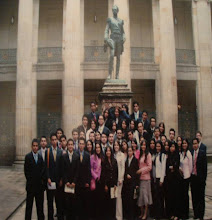China has refined its technological methods for controlling the Internet allow blocking only parts of sites instead of entire pages; if the website is domestic, they can issue a warning or close it down, a practice that is common during "sensitive periods" of the year8, such as during elections or visits from foreign officials. One Harvard Law School student found that China regularly denies local users access to 19,000 sites, representing the most extensive Internet censorship in the world.9
Enforcement of laws is swift and strict; 3000 of China's 45,000 Internet cafes were shut down between 2002 and 2003. At that time a fifth of Chinese users logged on from such cafes.10 In 2002 Liu Di, known online as "Stainless Steel Mouse," was confined for a year for dissident postings, and web journalist Shi Tao was sentenced to 10 years for demanding remembrance of Tiananmen Square.11 As of May 2004, Reporters Without Borders counted 61 "cyber-dissidents" in jail in China.
Critics say that China's limits on publicly-available information repress individual freedoms and hinder academic research. However, both President Hu Jintao and former President Jiang Zemin have affirmed their support of the Internet as a popular medium12, Zemin called it an "engine for development." 13 Regarding science and censorship, Professor Shoucheng Zhang of Stanford's physics department said, "you can clearly have both" in a 2002 interview with Business Week. He remarks that most academic archives are "accessible by anyone" online, even when a university's website is blocked, and projects that some Chinese scientific schools could match MIT and Stanford in 50 years.
Other countries notable for attempting to restrict Internet content are Iran and Saudi Arabia, where the government owns all servers or requires private companies to filter out anti-Islamic and pornographic material. In 1996, the US Congress passed the Communications Decency Act. imposing content restrictions on the Internet, such as restriction on posting "indecent" or "patently offensive" materials web pages, newsgroups, chat rooms, or online discussion lists. In 1997, the U.S. Supreme Court struck down the act as unconstitutional.
At the same time, the US is criticized for monopolizing ownership of the world's web address system and thereby maintaining "the theoretical power to cut [many governments] off from the Internet system by blocking the country suffix." The US refused an EU proposal to hand ownership over to an international body most recently on September 30.16 Australia's 1999 Broadcasting Services Amendment bans pornography and France's 1999 case LICRA and UEJF vs. Yahoo! Inc. and Yahoo France prohibits revisionist and Nazi-related material. But Charles Li of the Law Faculty of the University of Ottawa argues that unlike Australia's and France's specific limits, "China's emphasis is to control the political, economic, social and cultural information, as well as any ‘unhappy Information', which constitutes a broad and sometimes unpredictable category of content."
While China's regulations may fuel fears that it remains a repressive regime, Internet usage and access have increased steadily, and PRC leaders have repeatedly expressed support for the medium. Internet forums are beginning to open up in comparison to traditional press mediums. Stories of social injustice were discovered and spread over the Internet and, on the surface, the government was thankful for these leads. The Internet has led to greater freedom of speech for Chinese citizens, compared to 15 years ago. China never claims to be a democratic country and so it is resentful of the West telling it what is "right and wrong." It is a long and painful process to change and hopefully the Internet will allow China to move in the direction of openness, rather than repression.
miércoles, 27 de febrero de 2008
Internet regulations in China. Be Alejandro Cañas B.
Suscribirse a:
Enviar comentarios (Atom)

No hay comentarios:
Publicar un comentario